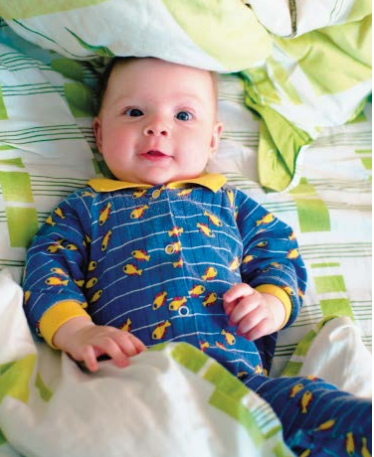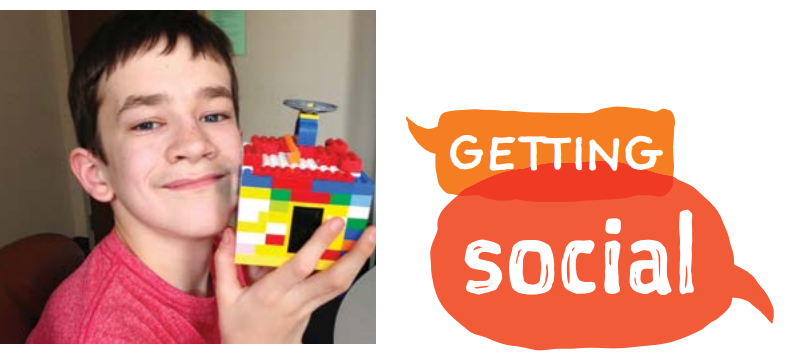Help is on the way for your baby’s sleep challenges!
As any new parent can tell you, getting your baby to sleep can be hard. And it doesn’t help the morale of an exhausted parent when the first question from every well-meaning friend seems to be, “Is she sleeping through the night?”
Many people turn to books or other parents for sleep advice, but this can be rocky terrain. “Some books on the market can be distressing for parents,” said Dr. Laurel Wills, a pediatric sleep specialist with Gillette Children’s Specialty Health Care. “There can be a lot of polarity between people who promote the family bed versus the ‘cry it out’ camp, for example.”
With all of the conflicting advice and prescriptive sleep-training techniques, it can be difficult to know what’s best for your baby. That’s when parents might benefit from some in-person assistance in the form of classes, in-person sleep education, and in some cases, medical intervention.
Classes and community
The Twin Cities is home to a variety of educational classes for new parents, including the popular Early Childhood Family Education (ECFE) programs and the “new mama” classes at Amma Parenting Center. These classes give participants the opportunity to build a community while benefitting from the advice of professionals who are well-versed in the idiosyncrasies of baby sleep, and other new-parent concerns, as well.
At Amma, instructors cover topics that are often glossed over in books, like the potential impact of a baby’s temperament on sleep. “Temperament is the most overlooked factor in baby sleep,” says Sara Pearce, founder of Amma. In Amma’s classes, parents learn about the science of sleep and how to effectively read their baby’s cues. Instructors also offer strategies for helping “shape” a baby’s sleep—what Sara refers to as “practice sessions.” “I like the connotation of a ‘practice session’,” says Pearce. “It conveys the idea that you’re working with your baby toward eventual success.”
In addition to learning about sleep strategies, the group environment of a class can also be valuable by assuring new parents they aren’t alone. “One of the greatest offerings of ECFE is the supportive group of other parents who are going through the same things,” said Renee Torbenson, parent educator in the Minneapolis ECFE program. “It can be a relief when a parent realizes that the challenges they thought were unusual are actually quite common.”
One-on-one sleep education
While the advice and assistance provided in a class is oftentimes enough to help a parent address her baby’s sleep issues, sometimes the challenges persist. In these cases, parents might benefit from the services of a professional sleep educator.
Mary Sheedy Kurcinka, author of Raising Your Spirited Child and Sleepless in America, provides sleep education services to families in the Twin Cities. “By the time parents seek help, they’ve been working very hard,” says Kurcinka. “I help them by focusing on strengths and successes.” Kurcinka also emphasizes the often-overlooked temperament factor. “Twenty to 25 percent of normal infants are what I refer to as ‘spirited,’” she says. “They are very alert, sensitive babies, and it’s harder to read their cues—they move through them very quickly.”
Kurcinka specializes in these spirited children. “Sometimes I’ll videotape the baby and review it with the parents later to work on the subtleties of cue reading.” In addition to helping parents learn to “read” their babies, Kurcinka also develops a detailed plan for the family.
“My focus is on developing an approach that is sustainable for the whole family,” says Kurcinka. “It’s always an individualized plan.” After the meeting, Kurcinka provides a written report of the recommendations that were discussed—a helpful follow-up for parents whose memories might be challenged by sleep deprivation.
The medical perspective
With all the controversy surrounding various “sleep training” methods, it can be easy to overlook the fact that some babies have trouble sleeping because of an underlying medical issue. “Common issues are anything that would cause discomfort or distress,” says Dr. Wills. “Respiratory issues like asthma, food allergies, abdominal discomfort, acid reflux, neurological conditions, even itching from eczema—these can all interrupt sleep.” If you suspect that your baby is missing sleep for medical reasons, Dr. Wills suggests visiting your pediatrician or family doctor first. She emphasizes the importance of finding a primary care doctor who you respect and trust, who can watch your baby grow over time.
If this doctor is unable to determine the cause of your baby’s sleep issues, it might be time to pay a call to a specialist.
“They key is to find the underlying condition and get that under control,” Dr. Wills says. “My job as a physician is to find out if the issue is medical, developmental, or related to temperament.” For common issues like acid reflux, the baby might find relief with medications or by sleeping on an incline. Respiratory issues tend to be a bit more complicated in terms of treatment, and in some rare cases (certain neurological issues, for example) surgery might even be an option. Neurological conditions and disabilities can also affect sleep, though most can be treated effectively.
Aside from medical diagnosis, Dr. Wills often asks parents to keep a sleep log for their baby for at least two weeks. She helps them interpret the information and learn more about their baby’s ideal sleep rhythm. She focuses on the importance of setting a good foundation for sleep in the early months and years of a child’s life. “The more competent parents feel when it comes to getting their baby to sleep, the less likely it is that problems will persist later.”
Dr. Wills emphasizes that there is, in fact, a happy medium when it comes to babies and sleep.
“I work with my patients to find that delicate balance,” she says. “I want parents to know they can develop nurturing ways to set limits and structure for their children’s sleep that can have a lasting, positive impact.”
SLEEP RESOURCES-
Classes-
Amma Parenting Center: Prenatal and new parent classes, including specific classes focusing on sleep.
ammaparentingcenter.com
952-926-BABY
Early Childhood Family Education: Parent and early childhood education for families with children between birth and kindergarten age.
Minneapolis: ecfe.mpls.k12.mn.us
St. Paul: ecfe.spps.org
In-person sleep education services
Mary Sheedy Kurcinka | Parent Child Help | 651-452-4771
Medical Resources-
Gillette Children’s Specialty Healthcare, Sleep Health Clinic Dr. Wills wanted to emphasize that in addition to providing support for families with typically developing children, the Sleep Health Clinic provides help to children with special health needs such as cancer, seizures, heart problems and developmental disabilities.
651-229-3890
Pediatric Sleep Disorders Clinic at Children’s Hospitals and Clinics
St. Paul| 651-220-6258
Minnesota Parent may earn a small commission for our endorsement, recommendation, testimonial, and/or link to any products or services from this website.


















